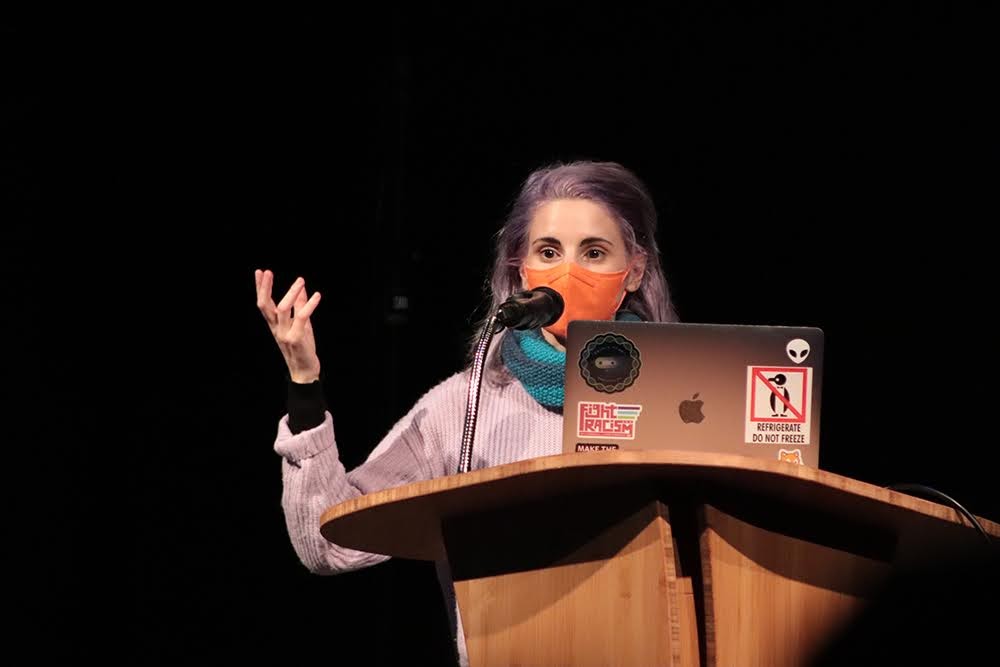On Feb. 22, the Innovative Media Research and Commercialization Center (IMRC) hosted media artist Alexis Hope from the Massachusetts Institute of Technology (MIT) Media Lab for a lecture on the use of hackerspaces for design purposes. The IMRC, located in Stewart Commons, hosts six presentations each semester that are free and open to anyone in the community.
“[Artists] cover a wide range of practices from 2D, photography, video, performance, sound art and social practices,” said Susan Smith, director of intermedia programs. The presentations can be viewed in person or virtually.
“Intermedia is committed to bringing a diverse roster of artist practitioners, both emerging and well-established artists, representing the gamut of creative practice,” said featured artist Alexis Hope. “Students can hear how professional artists are not only making, but supporting themselves through their work. Theories, philosophies behind the works are discussed, and students have the opportunity to talk to the artist themselves about topics of their choosing.”
Hope has contributed to some scientific advancements in the media lab. For example, she helped contribute to the expansion of accessible scientific tools that can be easily used in typically uncooperative environments such as deep-sea surveillance and data collection.
Hope is also a part of Lifelong Kindergarten, a research group that is built on the principle of constructivism. Lifelong Kindergarten developed the software SCRATCH, a programming language for children that uses blocks that kids can stack and create code.
Hope’s lecture covered her thesis on the use of Hackathons to promote community innovation. Hackathons are a recent form of community gathering that was centralized to the technology industry. These gatherings occur as a weekend seminar where people from diverse organizations and institutions trade ideas or strategies to create more effective technology advancements. Technology companies would use these events to scout out potential hires or features they could use in their platform. However, Hope and her team used Hackathons to tackle an issue infrequently in the spotlight: breastfeeding.
The idea came from her fellow student at MIT who began to express distress over the atmosphere of breast pumping in the workplace. She recognized that there was no safe space for her to pump as she would begin the painful process of breast pumping with outdated equipment on the bathroom floor. She would rather breastfeed her child, but that was not an option. Breastfeeding is not an option for 25% of moms that go back to work after maternity leave. Many women go back to work 10 days after their child is born, which many express is hard for their unhealed bodies and mental health.
“‘Inventing the future’ is the motto for MIT’s media lab, so why are women and children left in the past?” Hope said.
It was with this idea in mind that Hope and her team, with the help of a post that went viral and the emails of thousands of moms, that they contacted local organizations to create a Hackathon that was a safe and open space where women could share their ideas for a more effective way of breast pumping and dissolve the stigma of the post-pregnancy experience in the workforce.
“Solutions for the problems came from the community,” Hope said. “People can be experts on their own problems and the solutions that surround them.”
The Hackathon proved to be successful and occurred yearly after the first meeting in 2018. Women not only found ways to create changes to the breast pump itself, but found ways for women in socio-economic hardships a safe way to feed their children. For instance, a woman from New Orleans created a disaster relief kit that allowed for women affected by natural disasters to pump safely. She raised enough funds to create a prototype and marketed it to the Red Cross. From there, the kit was distributed to clinics around the New Orleans area.
The Hackathon, however, is still a new platform. There have not been many other organizations or institutions that have used it to bring awareness to these problems like Hope has. But in recent years, Hope has seen Hackathon growing in popularity.
“Who’s in the room [at a Hackathon] really changes what is addressed at one,” Hope said.
“We publicize the event schedule on our university website and always run on the digital sign at the football field,” Smith said. “Access to virtual events can be had by emailing umaineintermedia@maine.edu.”
For more information on upcoming events, visit the IMRC website at https://imrccenter.umaine.edu/.










